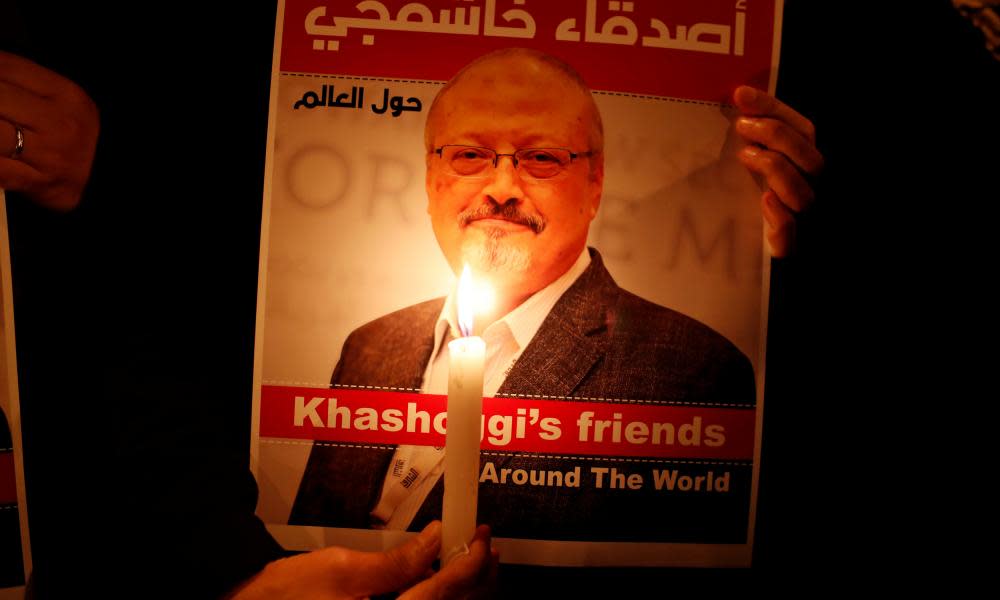Time magazine names Jamal Khashoggi and persecuted journalists 'person of the year'

Time magazine has collectively named Jamal Khashoggi and other killed and imprisoned journalists as its “person of the year” for 2018.
The magazine gave the title – which goes to the person they judge has been the most influential over the past year – to “the Guardians and the War on Truth”.
Those named also included the journalists killed in the mass shooting at the Capital Gazette in Maryland in June, two Reuters reporters jailed in Myanmar after investigating the massacre of Rohingya Muslims and Maria Ressa, a journalist in the Philippines facing tax evasion charges that she has called “political harassment”.
The Guardians—Jamal Khashoggi, the Capital Gazette, Maria Ressa, Wa Lone and Kyaw Soe Oo—are TIME's Person of the Year 2018 #TIMEPOY https://t.co/HvoEaW5oUi pic.twitter.com/9Mr0wBTmvj
— TIME (@TIME) December 11, 2018
“In its highest forms, influence – the measure that has for nine decades been the focus of Time’s Person of the Year – derives from courage. Like all human gifts, courage comes to us at varying levels and at varying moments,” Time magazine’s editor-in-chief, Edward Felsenthal, wrote in an essay about the selection.
“This year we are recognizing four journalists and one news organization who have paid a terrible price to seize the challenge of this moment: Jamal Khashoggi, Maria Ressa, Wa Lone and Kyaw Soe Oo and the Capital Gazette of Annapolis, Md.”
More than two months since Khashoggi’s disappearance, Saudi Arabia is still facing international condemnation over his brutal murder and alleged dismemberment at the hands of a Saudi hit team. The 61-year-old’s body has still not been found and is thought by Turkish investigators to have been dissolved in acid.
Time magazine’s person of the year started in 1927 and recognizes “the person or group of people who most influenced the news and the world – for better or for worse – during the past year”. It is decided by the magazine’s editors.
The journalists named are representative of many others facing serious risks to cover the stories of our time, the magazine said. Fifty-two journalists have been murdered in 2018.
The magazine editor said the selection was particularly relevant amid an assault around the world and in the United States on freedom of the press.
“It has long been the first move in the authoritarian playbook: controlling the flow of information and debate that is freedom’s lifeblood. And in 2018, the playbook worked. Today, democracy around the world faces its biggest crisis in decades,” Felsenthal wrote, calling the abuse and manipulation of the truth “an insidious and growing threat to freedom”.
In choosing Khashoggi, Time for the first time in its history picked someone who is deceased as a person of the year.
Felsenthal called him “the most visible representative of this harrowing year for truth”.
The Washington Post columnist’s death has sparked a global reassessment of Saudi Arabia’s crown prince Mohammed bin Salman and the west’s relationship with the repressive kingdom.
Time also named Ressa, the founder and editor of Rappler, a news site in the Philippines known for its reporting on President Rodrigo Duterte’s extrajudicial killings. The government has sued her site repeatedly, and she has faced violent threats online.
Five staffers at the Capital Gazette in Annapolis, Maryland, were murdered in June by a gunman angry about old coverage of him by the paper. The shooting made the US the fourth deadliest country in the world to be a journalist in 2018, tied with Mexico.
“But while the loss was immense and intensely personal, that day the staff at one of the nation’s oldest news outlets did what it has done since before the American Revolution – they put the paper out,” Felsenthal wrote.
The two young Reuters reporters, Kyaw Soe Oo and Wa Lone, were sent to prison for reporting on the killings of 10 Rohingya Muslims. They were sentenced to seven years, while the killers they revealed got 10 years.
The Reuters journalists also won two awards at the Press Gazette’s British Journalism Awards on Monday night, taking the prizes for best foreign affairs journalism and best overseas investigation for their work.
“We are all in debt to reporters who are willing to put their liberty on the line in order to tell the world things the world needs to know about,” said the judges in the investigation category.
“They investigated atrocities against Myanmar’s Rohingya Muslims in the face of very significant opposition from the government, a government which up until then we had thought was run by a saint. Their work had a major impact on international opinion and was genuine world-changing journalism.”
Time released four versions of its front page, featuring Khashoggi, Ressa, staffers at the Capital Gazette who survived the mass shooting and the wives of Wa Lone and Kyaw Soe Oo.
They noted there are plenty of other examples of embattled journalists this year, including Bangladeshi photographer Shahidul Alam, who was jailed for more than 100 days for criticizing the country’s prime minister, and freelance journalist Amal Habani in Sudan, who was arrested while covering a protest, detained for 34 days and beaten with electric rods.
Jim Waterson contributed to this report
• This article was amended on 12 December 2018 to delete a reference to “freelance journalist Sheikh Hasina”. That should have been “freelance journalist Amal Habani”.

 Yahoo News
Yahoo News 
